It's been nearly a year since the United States suffered an unprecedented attack on constitutional democracy.
When a violent mob stormed the U.S. Capitol on Jan. 6, the goal was to overturn the results of the 2020 presidential election and install Donald Trump to a second term.
Call it an insurrection or a coup attempt, it was fueled by what's known as the "Big Lie": the verifiably false assertion that Trump won. Joe Biden won 306 votes in the Electoral College, while Trump received 232. In the popular vote, Biden won by more than 7 million votes.
Many are warning that over the past year, that "big lie" of a stolen election has grown more entrenched and more dangerous.
"I've never been more scared about American democracy than I am right now, because of the metastasizing of the 'big lie,' " says election law expert Rick Hasen, co-director of the Fair Elections and Free Speech Center at the University of California, Irvine.
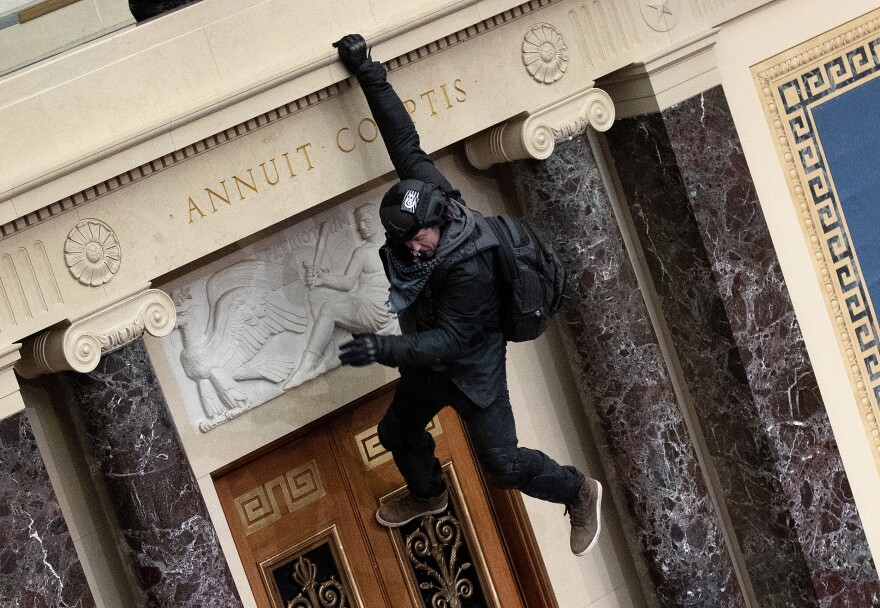
"This is not the kind of thing I expected to ever worry about in the United States," Hasen says. "I kind of feel like a climate scientist from five years ago or [an] expert on viruses a couple of years ago, sounding the alarm and just hoping that we're not too late already."
A "big lie" with roots in history
In rallies across the country, Trump continues to hammer on the fiction that the 2020 presidential election was stolen from him.
Speaking at a rally in Georgia in September, Trump trumpeted his familiar, baseless claim that the election was "corrupt" and "rigged."
"I have no doubt that we won, and we won big," Trump said. "The headlines claiming that Biden won are fake news — and a very big lie."
A couple of weeks later, he repeated the fiction at a rally in Iowa. "We didn't lose," he insisted to a crowd that rewarded him with chants of "Trump won!"
By inverting the narrative, attempting to slough off the "big lie" and pin it instead on his opponents, Trump exploited an age-old tactic, says Yale University history professor Timothy Snyder.
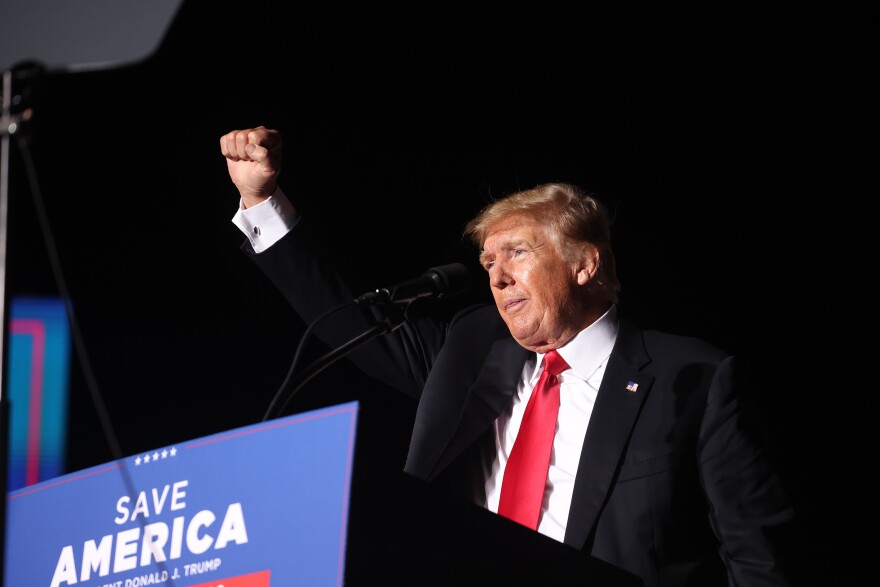
"Part of the character of the 'big lie' is that it turns the powerful person into the victim," he says. "And then that allows the powerful person to actually exact revenge, like it's a promise for the future."
Snyder, author of the books The Road to Unfreedom and On Tyranny, has spent years studying the ways tyrants skewer truth. Snyder points to Hitler's original definition of the "big lie" in his manifesto, Mein Kampf and the ways he used it to blame Jews for all of Germany's woes.
"The lie is so big that it reorders the world," Snyder says. "And so part of telling the big lie is that you immediately say it's the other side that tells the big lie. Sadly, but it's just a matter of record, all of that is in Mein Kampf."
A lie that's become embedded in public opinion
Over the past year, Trump's lie that election fraud cost him the White House has become firmly anchored in public opinion.
According to a CNN poll conducted this summer, fully 36% of Americans do not believe that President Biden legitimately won the election. Among Republicans, that number leaps to 78%.
In an NPR/PBS Newshour/Marist poll conducted in October, just 34% of Republicans say they trust that elections are fair, while 75% of Republicans say Trump has a legitimate claim that there were "real cases of fraud that changed the results." Just 2% of Democrats agreed with that statement.
What's more, says Timothy Snyder, "the 'big lie' is not just in people's minds. It's also now in the law books."
Snyder points to the raft of new laws passed in Republican-led states that restrict voting. Over the past year, at least 19 states have passed laws limiting ballot access.
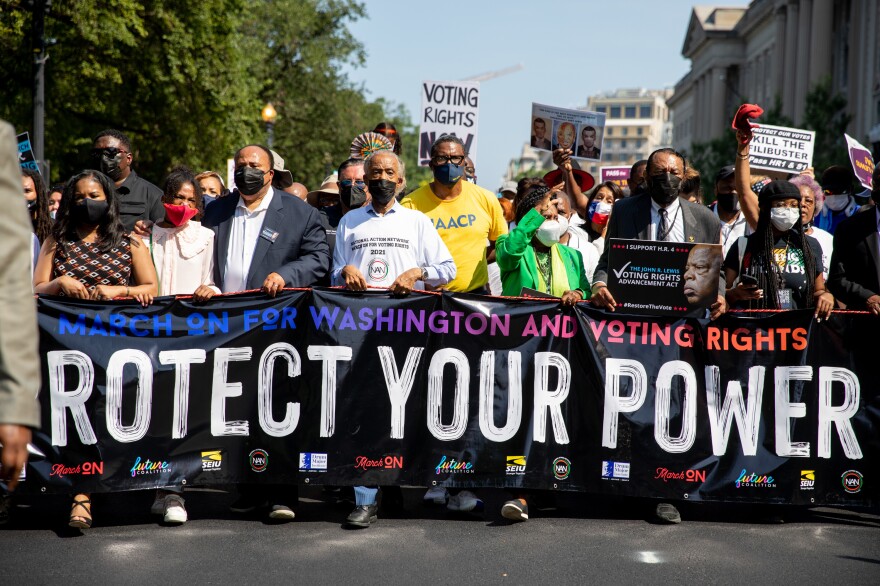
In addition, Trump loyalists in battleground states are running for powerful offices that control elections. These are candidates who are endorsed by Trump, because they've embraced his lie that he won the 2020 election.
And some Republican-controlled state legislatures have moved to seize power over elections, opening a path where they could overrule voters and substitute their own slate of electors to choose the winner.
All of it, Snyder says, is a direct outcome of Trump's "big lie" and is deeply troubling for the future.
"All of those things set us up for a scenario where the candidate who loses by every measure, not just by the popular vote, but by the Electoral College, the candidate who loses by every measure will nevertheless be installed as president of the United States," Snyder says. "I think that is probably the most likely scenario in 2024 as things stand now."
That scenario needs to be confronted immediately, Snyder says: "It's right in front of our eyes. The most interesting and the most distressing thing about American news coverage right now is that we don't treat the end of democracy in America as the story. That is the story."
We delude ourselves, Snyder says, if we think we're immune from an anti-democratic turn. "We imagine that there's somehow this immovable American democratic background, which doesn't really exist," he says. "We can lose democracy just like anybody else can, just like most people have in the history of democracy. We can lose it, and we're losing it right now."
"The fierce urgency of now"
As of yet, the Democratic-led Congress has been unable to pass legislation to protect voting rights, a fact that Carol Anderson, professor of African-American Studies at Emory University, finds appalling.
She argues that passing voting rights laws would "short-circuit the damage that the 'big lie' is doing and will do."
Anderson sees "a Democratic Party that does not understand that American democracy is hanging by a thread, and does not grapple with the fierce urgency of now."
We have been, in her words, "baptized in American exceptionalism" — the naive belief that the demise of democracy can't happen here.
"Even after you have had the insurrection," Anderson says, "even after you have had these legislatures write these laws figuring out not only how to stop Black people, brown people, indigenous people from voting, but also how to lower the guardrails of democracy that prevented Trump from being able to overturn the results in these states; so even after seeing this, to not move and do what needs to be done to protect this nation?" Anderson sighs. "It's unconscionable."
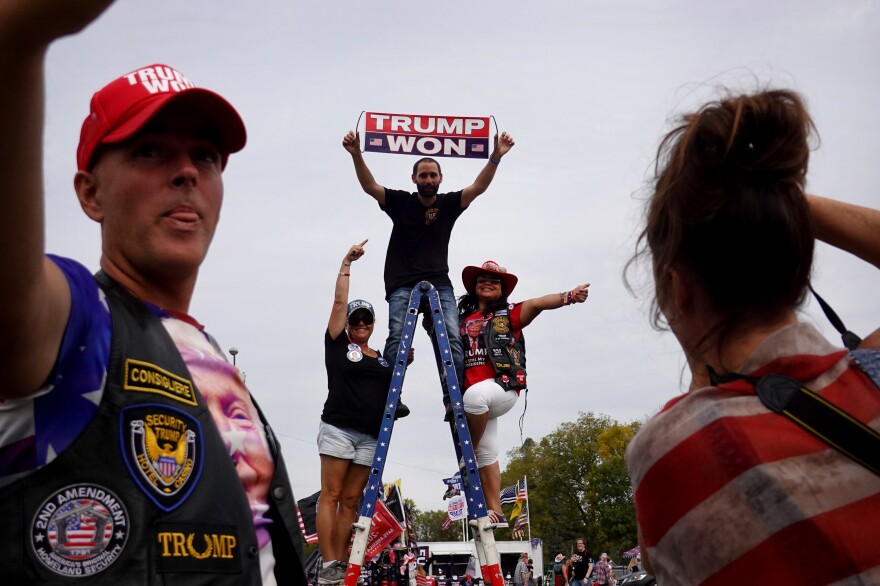
For Anderson, author of the books White Rage and One Person, No Vote: How Voter Suppression Is Destroying Our Democracy, Trump's lie about the election sprouts from the same twisted roots as his birtherism lie, which is the conspiracy theory Trump peddled, falsely claiming that Barack Obama was born outside the U.S. and therefore ineligible to serve as president.
Linking both, she says, is a clear racist throughline.
"Foundational to that is the devaluation and the dismissing of American citizenship for Black people," Anderson says. "This is about, 'My nation is about the real Americans. And all of those folks aren't real Americans.' It is so vile. It is so racist. And it works. That's the thing, it works."
After all, Anderson says, if you repeat the lie enough times, it starts to sound like the truth.
A failed coup is practice for a successful one
In Congress, the House Select Committee to Investigate the January 6th Attack on the United States Capitol has interviewed hundreds of witnesses to establish the truth of what happened that day.
Rep. Adam Kinzinger, R-Ill., is one of just two Republicans on the committee. An outspoken Trump critic, he has announced he won't run for reelection.
Kinzinger compares conspiracy theories to a cancer eating away at the Republican Party, and feeding that cancer, he says, is the "big lie."
"The thing that's most concerning is that it has endured in the face of all evidence," he says. "And I've gotten to wonder if there is actually any evidence that would ever change certain people's minds."
Beyond his committee's mission of uncovering what happened on Jan. 6 itself, Kinzinger has broader questions.
"More importantly in my mind, what is the rot in the system that led up to Jan. 6? And where have we come since? And how do we stop anything like this from happening again?" he asks. " 'Cause even though Jan. 6 technically failed, there's a lot of areas where you can learn from, if your goal is to overthrow a legitimate election and potentially do it successfully next time."
And that is precisely the lesson from history, says Yale professor Timothy Snyder.
"It wasn't enough, but next time, it could well be enough. And the fact that it's been rehearsed makes me worry," he says. "This is what historians and political scientists who study coups d'etat say. They say a failed coup is practice for a successful one."
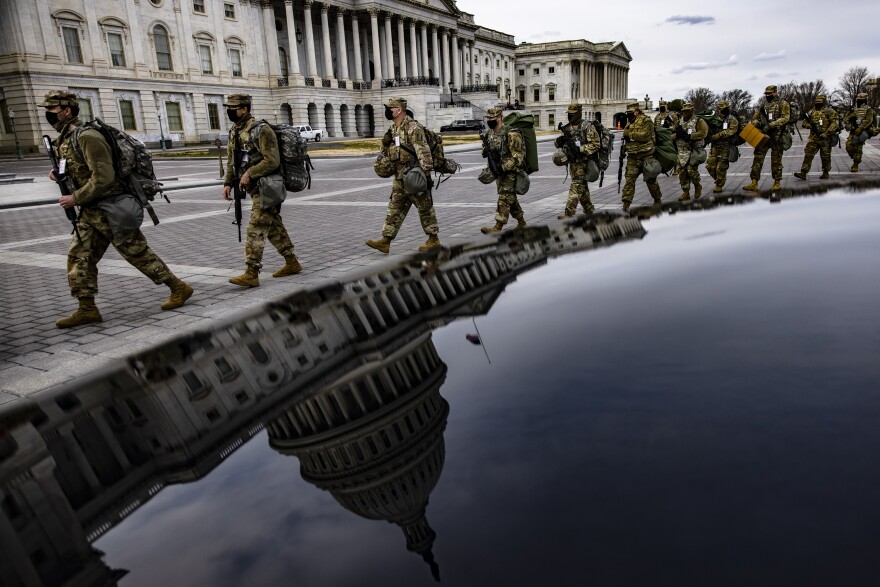
What we're potentially looking at, Snyder warns, is nothing less than the end of the democratic United States as we've come to know it.
"That's just the reality," he says. "And in order to prevent things from being frightening, you have to look right at them and say, 'OK, that's the monster. How can I disassemble it? How can I take it to pieces? How can I make sure that that story isn't our only story?' But it will be unless we tell it to ourselves straight."
We have to confront that reality, Snyder says, if we are to find the courage and conviction to do something about it.
Copyright 2023 NPR. To see more, visit https://www.npr.org.



